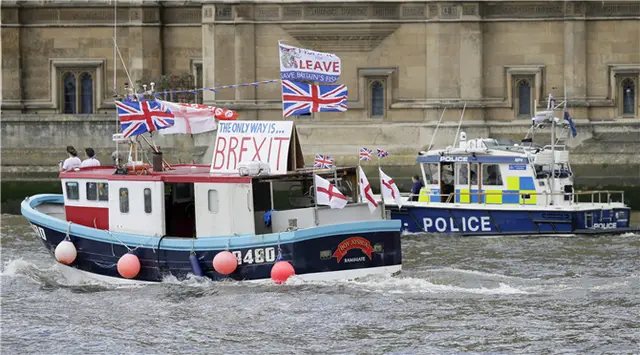London's River Thames became a battleground Wednesday when armadas from the "leave" and "remain" camps in the EU referendum campaigns clashed in front of the Houses of Parliament.
As dozens of boats gathered, both sides hurtled insults at each other as startled politicians watched from the terraces of the parliament buildings.
Nigel Farage, leader of UKIP, Britain's anti-EU political party, had led a flotilla of 30 fishing boats from Ramsgate along the river as part of his call for Britain to take back control of fishing around the British coast.
As the convoy reached Tower Bridge, they were greeted by a rival flotilla from the Remain campaign, led by rock musician and campaigner Sir Bob Geldorf who backs staying in Europe. Geldorf shouted at Farage he was "no fisherman's friend" as the two traded insults across the waves.
Boats of a flotilla participate in a campaign supporting Britain to leave the European Union in London, Britain, on June 15, 2016. Photo by: Xinhua/Tim Ireland
Campaigners fired water hose pipes as boats circled each other, while launches from the Metropolitan Police intervened to keep both sides at a safe distances.
Farage, who sits as an MEP in the European Parliament in Brussels, said Britain's fishing communities had been devastated by European regulations.
"We want to take back control of our seas, we want to get jobs back in this industry. There are now many harbors without a single commercial vessel," said Farage.
The flotilla arrived just as David Cameron was delivering his final Prime Minister's Questions time in the House of Commons ahead of the June 23 referendum to decide if Britain should stay in the EU or leave.
Nigel Farage,2nd L, leader of Britain's anti-immigration UKIP, waves to the crowd on a boat of a flotilla during a campaign supporting Britain to leave the European Union in London, Britain, on June 15, 2016.Photo by: Xinhua/Tim IrelandMost of the questions fired at Cameron, from all sides of the chamber, were from Remain supporters.
Chancellor of the Exchequer George Osborne provoked anger, including a threatened rebellion from 57 of his own Conservative colleagues, when he announced an emergency budget in the event of a Brexit win in just eight days.
Osborne said there would be a 30-billion-pound (42.5 billion U. S. dollar) cut in public spending to tackle a black hole in the economy, with the possibility of a 2-pence rise in the basic rate of income tax and a 3-pence rise in the higher tax rate.
Spending on police, transport and local government could also be cut by 5 percent, warned the Chancellor.
Conservative MP Iain Duncan Smith, criticized the threats saying it was absurd for Osborne to punish people for voting to take back control from the EU.
"If he were to proceed with these proposals, the chancellor's position would become untenable," Smith said in a joint statement with other Conservative Brexit supporters.
Jeremy Corbyn, leader of the pro-remain Labour Party said he would not support an emergency budget.
Vote Leave published their own framework Wednesday, spelling out a road map needed to implement new policies and measures needed if Britons vote to quit the EU.
Boats of a flotilla participate in a campaign supporting Britain to leave the European Union in London, Britain, on June 15, 2016.Photo by: Xinhua/Tim IrelandLeading Brexit MP Chris Grayling, Leader of the House of Commons, said after a vote-to-leave decision on June 23, the public would need to see there was immediate action to take back control from the EU.
"We will need a carefully managed negotiation process and some major legislative changes before 2020, including taking real steps to limit immigration, to abolish VAT on fuel and tampons, and to end the situation where an international court can tell us who we can and cannot deport."
Leave said its road map would also include a Free Trade Bill to restore the British government's power to control its own trade policy.
"That would create jobs and the UK would take back its seat at the World Trade Organization, becoming a more influential force for free trade and friendly cooperation," said Grayling.
(APD)
 简体中文
简体中文

